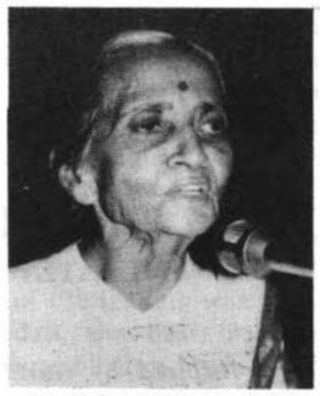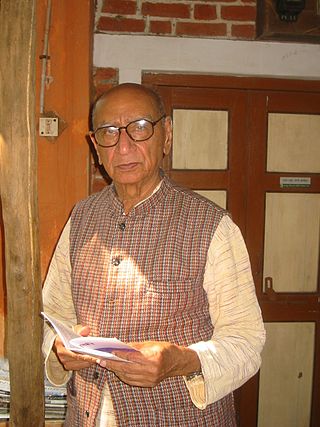
Vinayak Narahari Bhave, also known as Vinoba Bhave, was an Indian advocate of nonviolence and human rights. Often called Acharya, he is best known for the Bhoodan Movement. He is considered as National Teacher of India and the spiritual successor of Mahatma Gandhi. He was an eminent philosopher. He translated the Bhagavad Gita into the Marathi language by him with the title Geetai.
Sarvōdaya is a Sanskrit term which generally means "universal uplift" or "progress of all". The term was used by Mahatma Gandhi as the title of his 1908 translation of John Ruskin's critique of political economy, Unto This Last, and Gandhi came to use the term for the ideal of his own political philosophy. Later Gandhians, like the Indian nonviolence activist Vinoba Bhave, embraced the term as a name for the social movement in post-independence India which strove to ensure that self-determination and equality reached all strata of Indian society. Samantabhadra, an illustrious Digambara monk, as early as the 2nd century A.D., called the tīrtha of Mahāvīra by the name sarvodaya.

Khadi, derived from khaddar, is a hand-spun and woven natural fibre cloth promoted by Mahatma Gandhi as swadeshi (self-sufficiency) for the freedom struggle of the Indian subcontinent, and the term is used throughout India, Pakistan and Bangladesh. The first piece of the hand-woven cloth was manufactured in the Sabarmati Ashram during 1917–18. The coarseness of the cloth led Gandhi to call it khadi. The cloth is made from cotton, but it may also include silk or wool, which are all spun into yarn on a charkha. It is a versatile fabric that remains cool in summer and warm in winter. To improve its appearance, khadi is sometimes starched to give it a stiffer feel. It is widely accepted in various fashion circles.

Gandhism is a body of ideas that describes the inspiration, vision, and the life work of Mohandas K. Gandhi. It is particularly associated with his contributions to the idea of nonviolent resistance, sometimes also called civil resistance.

Usha Mehta was a Gandhian and independence activist of India. She is also remembered for organizing the Congress Radio, also called the Secret Congress Radio, an underground radio station, which functioned for few months during the Quit India Movement of 1942. In 1998, the Government of India conferred on her Padma Vibhushan, the second highest civilian award of the Republic of India.

Narayan Desai was an Indian Gandhian and author.

Manibhai Bhimbhai Desai was an Indian social activist, associate of Mahatma Gandhi, and a pioneer of rural development.

Malati Devi Choudhury was an Indian civil rights and freedom activist and Gandhian. She was born in 1904 in an upper middle class Brahmo family. She was the daughter of Barrister Kumud Nath Sen, whom she had lost when she was only two and a half years old, and Snehalata Sen, who brought her up.
Gandhian economics is a school of economic thought based on the spiritual and socio-economic principles expounded by Indian leader Mahatma Gandhi. It is largely characterised by rejection of the concept of the human being as a rational actor always seeking to maximize material self-interest that underlies classical economic thinking. Where Western economic systems were based on what he called the "multiplication of wants," Gandhi felt that this was both unsustainable and devastating to the human spirit. His model, by contrast, aimed at the fulfillment of needs – including the need for meaning and community. As a school of economics the resulting model contained elements of protectionism, nationalism, adherence to the principles and objectives of nonviolence and a rejection of class war in favor of socio-economic harmony. Gandhi's economic ideas also aim to promote spiritual development and harmony with a rejection of materialism. The term "Gandhian economics" was coined by J. C. Kumarappa, a close supporter of Gandhi.

J. C. Kumarappa was an Indian economist and a close associate of Mahatma Gandhi. A pioneer of rural economic development theories, Kumarappa is credited for developing economic theories based on Gandhism – a school of economic thought he coined "Gandhian economics."
G. Ramachandhran was a soldier for the Gandhian cause, social reformer and a teacher. With his wife, Dr. T. S. Soundram, daughter of T V Sundaram Iyengar, founder of TVS Group, he started the Gandhigram, Tamil Nadu in 1945. He authored several books. Viswabharati, Rabindranath Tagore's University, in Santhiniketan awarded him the higher title "Desikottama".

Rajagopal P. V. is an Indian Gandhian activist, a former Vice Chairman of the New Delhi Gandhi Peace Foundation, aswell as the president and founding member of Ekta Parishad. In 1972, Rajagopal started working alongside Gandhian activists J.P. Narayan and Subba Rao to disarm 578 bandits in the Chambal region of India. Thereafter, he stayed away from dealing with direct violence and focused on the people of Adivasis, bonded labourers, and other landless communities affected by poverty and exploitation.

The Noakhali riots were a series of semi-organized massacres, rapes and abductions, combined with looting and arson of Hindu properties, perpetrated by the Muslim community in the districts of Noakhali in the Chittagong Division of Bengal in October–November 1946, a year before India's independence from British rule.

Ravindra Kumar is a Political Scientist, Peace Educator, an Indologist, a Humanist, Cultural Anthropologist and a former Vice-Chancellor of CCS University, Meerut (India).

Sonaimuri (সোনাইমুড়ী) is a newly established upazila or sub-district in Noakhali District, Bangladesh. It consists of ten union councils or parishads - Ambarnagar, Amisha Para, Bazra, Deoti, Jayag, Nadana, Nateshwar, Sonaimuri, Sonapur and Baragaon. Sonaimuri was declared as an upazila in response to a popular demand in 2005. The area of Sonaimuri is 169.14 km2 while its population is 327,194. People in this upazila is generally solvent and engaged in business and agriculture.
M. Aram (1927–1997) was an educator and peace advocate from India.
Jharna Dhara Chowdhury was a Bangladeshi social activist.
Sailesh Kumar Bandopadhyay was an Indian social activist and Gandhian, who was a close associate of Mahatma Gandhi. The Government of India honoured him in 2010, with the Padma Bhushan, the third-highest civilian award, for his services to the fields of medicine and public health.
Natwar Thakkar, popularly known as Natwar Bhai, was an Indian social worker who worked in Nagaland. He came from Maharashtra but migrated to Nagaland for social work at the age of 23. He founded the Nagaland Gandhi Ashram at Chuchuyimlang village in the Mokokchung district of Nagaland. Because of his efforts to spread Gandhian philosophy in Nagaland and his social work, he was known as "Nagaland's Gandhi".
Malji Bhai Desai is a Gandhian social worker and a politician from the Indian State of Gujarat. He founded the Gandhi Ashram in Zilia village in Patan district in Gujarat in 1964 for the economic and educational development of the rural population of Gujarat. Under the aegis of the Ashram, several educational institutions were established and several projects were implemented for the economic development of the population. He was a devout Gandhian and the Ashram was an instrument for Desai to popularize the Gandhian way of life among the general populace.












